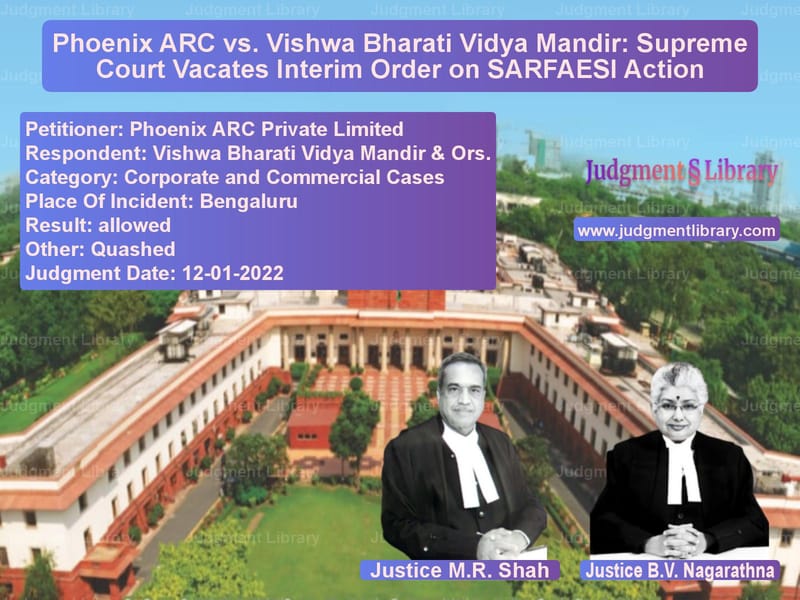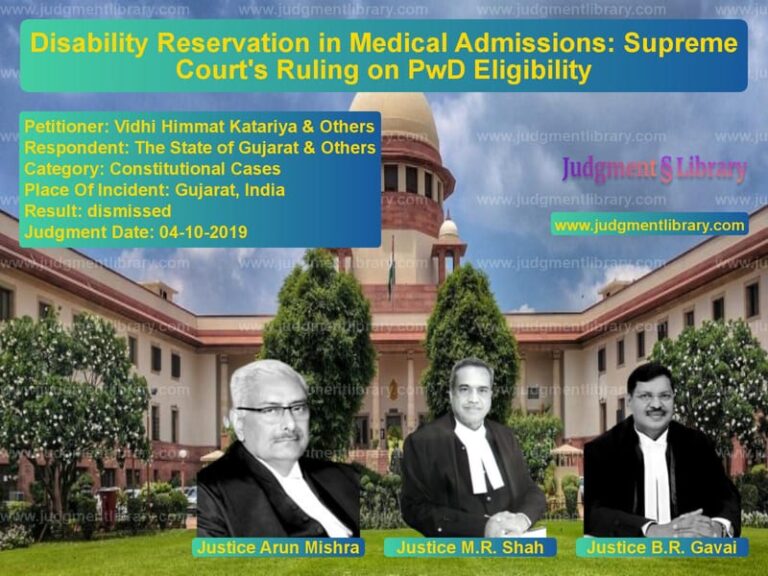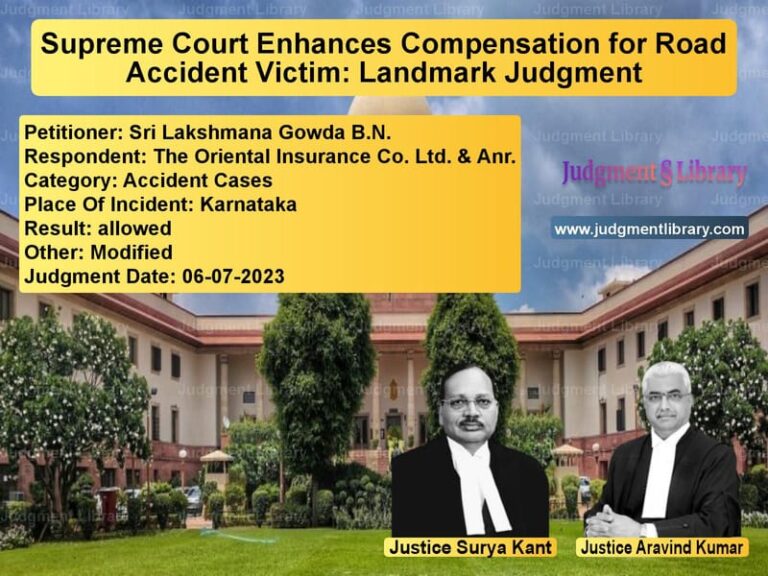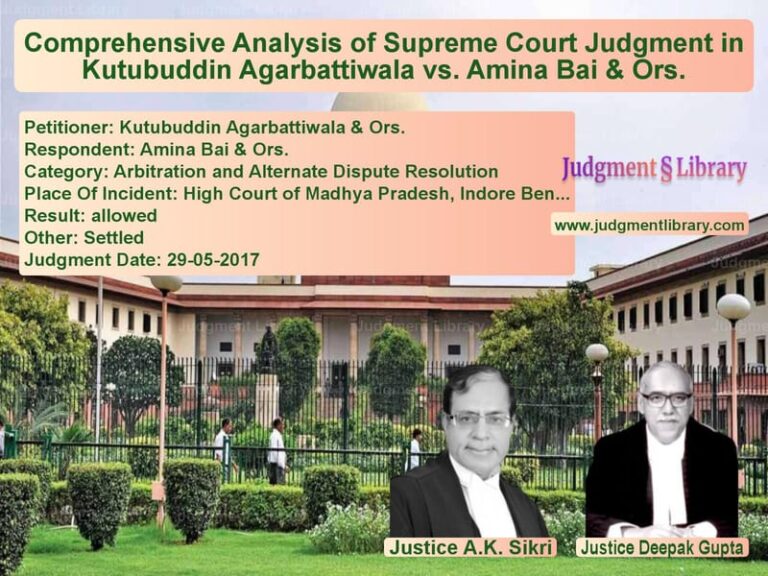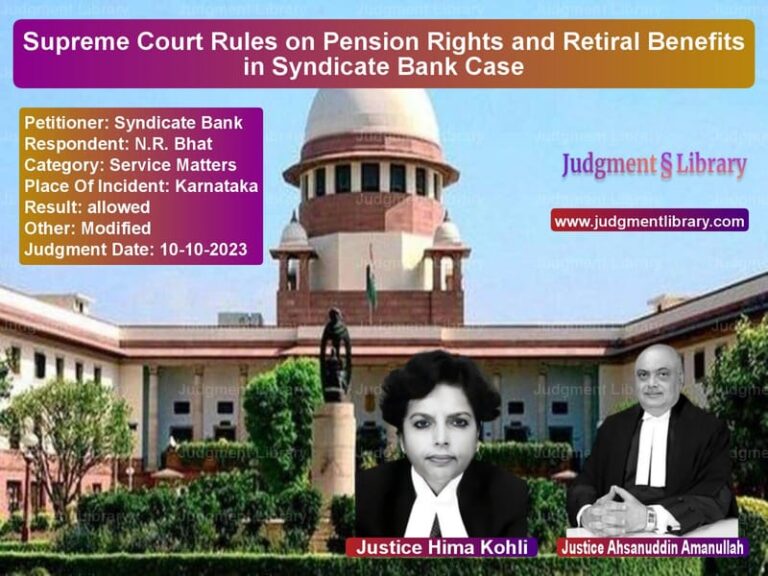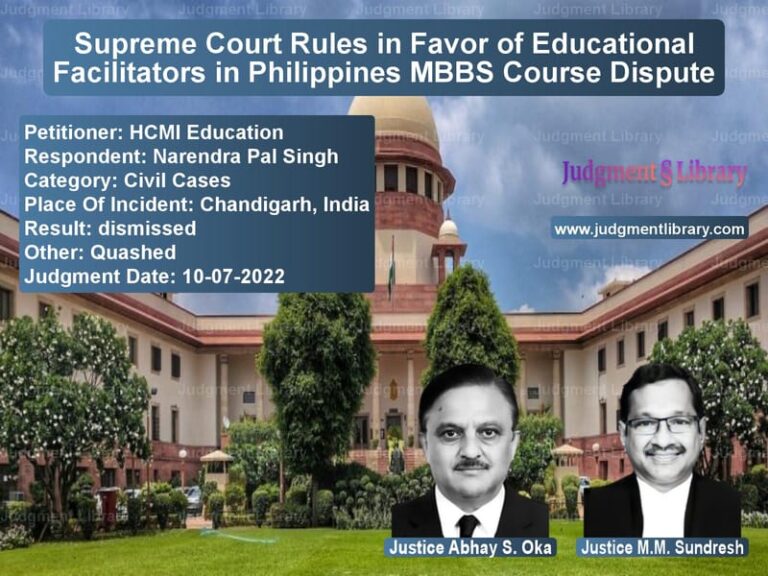Phoenix ARC vs. Vishwa Bharati Vidya Mandir: Supreme Court Vacates Interim Order on SARFAESI Action
The case of Phoenix ARC Private Limited vs. Vishwa Bharati Vidya Mandir & Ors. revolves around the enforcement of security interests under the SARFAESI Act, 2002, involving the appellant, Phoenix ARC Private Limited, and the respondents, Vishwa Bharati Vidya Mandir and its associated entities. The respondents had availed loans from Saraswat Co-operative Bank Limited, which they failed to repay, leading to the assignment of the debts to the appellant. The appellant sought to enforce its rights under the SARFAESI Act, but the respondents filed writ petitions challenging the enforcement action. The Supreme Court examined the issues of maintainability of the writ petitions and the legality of interim orders passed by the High Court.
Background of the Case
The respondents, Vishwa Bharati Vidya Mandir and St. Ann’s Education Society, had taken loans from Saraswat Co-operative Bank Limited, amounting to Rs. 105.60 crores and Rs. 20.05 crores respectively. The loans were secured by a deposit of title deeds and personal guarantees. However, the borrowers defaulted on the repayment, and the account was classified as a Non-Performing Asset (NPA) in 2013.
In March 2014, the NPA account was assigned to the appellant, Phoenix ARC Private Limited, as per the provisions of the SARFAESI Act. Despite this, the borrowers continued to default, and the appellant issued notices under Section 13(2) of the SARFAESI Act. In response to the ongoing defaults, the appellant sought to take possession of the mortgaged properties.
The respondents filed writ petitions before the High Court, challenging the action taken by Phoenix ARC. They argued that under Section 44A of the CPC, the foreign decree could not be executed in India unless the money decree exceeded Rs. 20 lakhs, which at the time was the pecuniary jurisdiction limit of the Delhi High Court. Further, they argued that the jurisdiction should be exercised by the District Court and not the High Court.
Petitioner’s Arguments
The appellant, represented by Shri V. Giri, contended the following points:
- The respondents had been defaulting on their repayment despite multiple notices, and the appellant was justified in taking action under the SARFAESI Act.
- The writ petitions filed by the respondents were not maintainable as they were filed against a private entity (Phoenix ARC) and were attempting to challenge the actions taken under the SARFAESI Act.
- The action taken by the appellant was merely a proposal to take possession of the property and not an immediate measure under Section 13(4) of the SARFAESI Act.
- The interim orders passed by the High Court were unjustifiable and had allowed the borrowers to deposit a mere Rs. 1 crore as a condition to maintain status quo, despite the total dues of Rs. 117 crores.
Respondent’s Arguments
The respondent, represented by Shri Basavaprabhu S. Patil, argued:
- The writ petitions were maintainable against Phoenix ARC, as it was performing a public function by enforcing the SARFAESI Act.
- The statutory duty under Rule 8 of the Security Interest (Enforcement) Rules, 2002 had been violated, as the prescribed procedures for possession and publication were not followed by the appellant.
- The borrowers were ready to settle the matter with the appellant, as indicated by their willingness to deposit Rs. 3 crores in total.
- The High Court’s interim orders were based on the need to balance the interests of both parties and were not prejudicial to the appellant.
Key Observations of the Supreme Court
A bench comprising Justice M.R. Shah and Justice B.V. Nagarathna made the following key observations:
- The Court noted that the communication dated 13.08.2015 by the appellant did not qualify as a notice under Section 13(4) of the SARFAESI Act, as it was only a proposal to take possession and not a formal action under the Act.
- It was emphasized that the writ petitions challenging the actions of a private party under the SARFAESI Act were not maintainable, as the statute provides an alternative remedy through appeals under Section 17 of the SARFAESI Act.
- The Court observed that the balance of convenience favored the appellant, as the borrowers had defaulted on substantial loans, and the total dues amounted to Rs. 117 crores.
Final Judgment
The Supreme Court ruled:
- The High Court’s order was set aside, and the writ petitions filed by the respondents were dismissed.
- The Court found that the High Court had wrongly entertained the writ petitions and passed interim orders without considering the alternative remedy available to the respondents under Section 17 of the SARFAESI Act.
- The Court directed that the interim orders, which had been passed by the High Court, be vacated and that the appellant be allowed to proceed with the actions under the SARFAESI Act.
- The appellant was entitled to take possession of the secured assets without any further delay, in line with the SARFAESI Act.
Implications of the Judgment
The ruling has significant legal implications:
- Jurisdictional Precedent: The decision clarifies that writ petitions against private entities like ARC, involved in enforcement under the SARFAESI Act, are not maintainable, and the remedy lies through an appeal to the Debt Recovery Tribunal.
- Alternative Remedy Doctrine: The ruling reinforces the doctrine that writ petitions under Article 226 of the Constitution should not be entertained when an alternative statutory remedy is available.
- Enforcement of Financial Rights: The judgment ensures that the SARFAESI Act’s provisions for the enforcement of financial obligations are upheld and are not obstructed by procedural technicalities.
Conclusion
The case of Phoenix ARC Private Limited vs. Vishwa Bharati Vidya Mandir highlights the Court’s determination to enforce financial recovery through statutory mechanisms and its emphasis on the availability of alternative remedies under the SARFAESI Act. This ruling not only protects the rights of financial institutions to recover dues but also underscores the importance of adhering to legal procedures while seeking judicial intervention.
Petitioner Name: Phoenix ARC Private Limited.Respondent Name: Vishwa Bharati Vidya Mandir & Ors..Judgment By: Justice M.R. Shah, Justice B.V. Nagarathna.Place Of Incident: Bengaluru.Judgment Date: 12-01-2022.
Don’t miss out on the full details! Download the complete judgment in PDF format below and gain valuable insights instantly!
Download Judgment: phoenix-arc-private-vs-vishwa-bharati-vidya-supreme-court-of-india-judgment-dated-12-01-2022.pdf
Directly Download Judgment: Directly download this Judgment
See all petitions in Debt Recovery
See all petitions in Commercial Arbitration
See all petitions in Banking Regulations
See all petitions in Judgment by Mukeshkumar Rasikbhai Shah
See all petitions in Judgment by B.V. Nagarathna
See all petitions in allowed
See all petitions in Quashed
See all petitions in supreme court of India judgments January 2022
See all petitions in 2022 judgments
See all posts in Corporate and Commercial Cases Category
See all allowed petitions in Corporate and Commercial Cases Category
See all Dismissed petitions in Corporate and Commercial Cases Category
See all partially allowed petitions in Corporate and Commercial Cases Category

